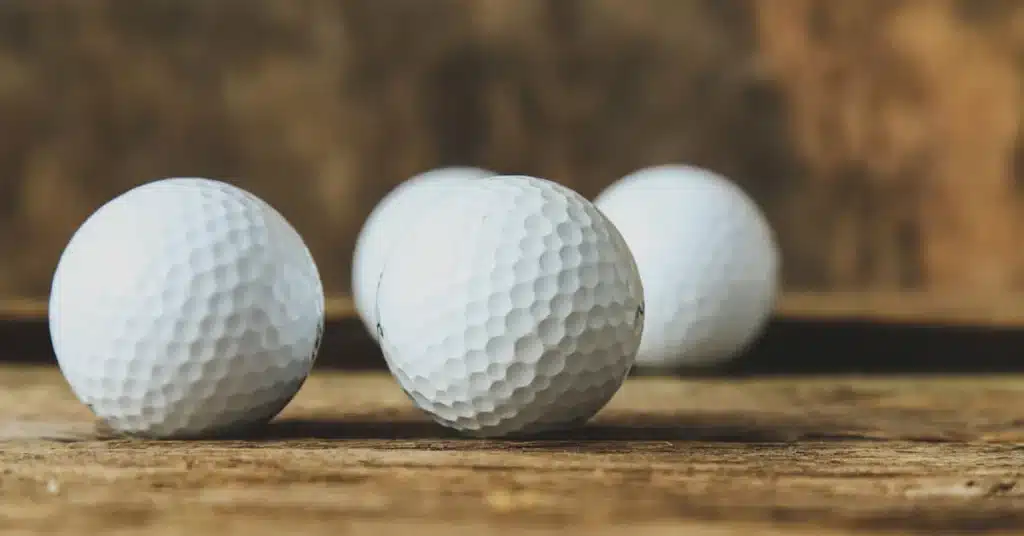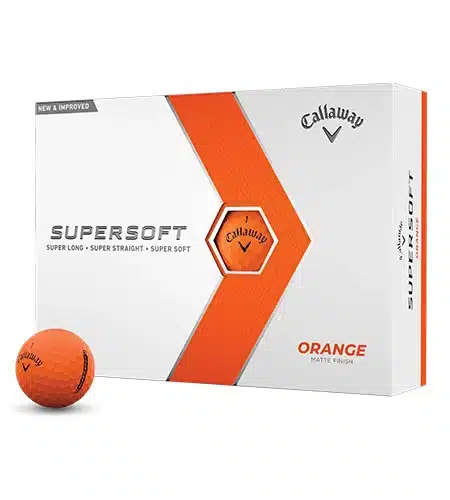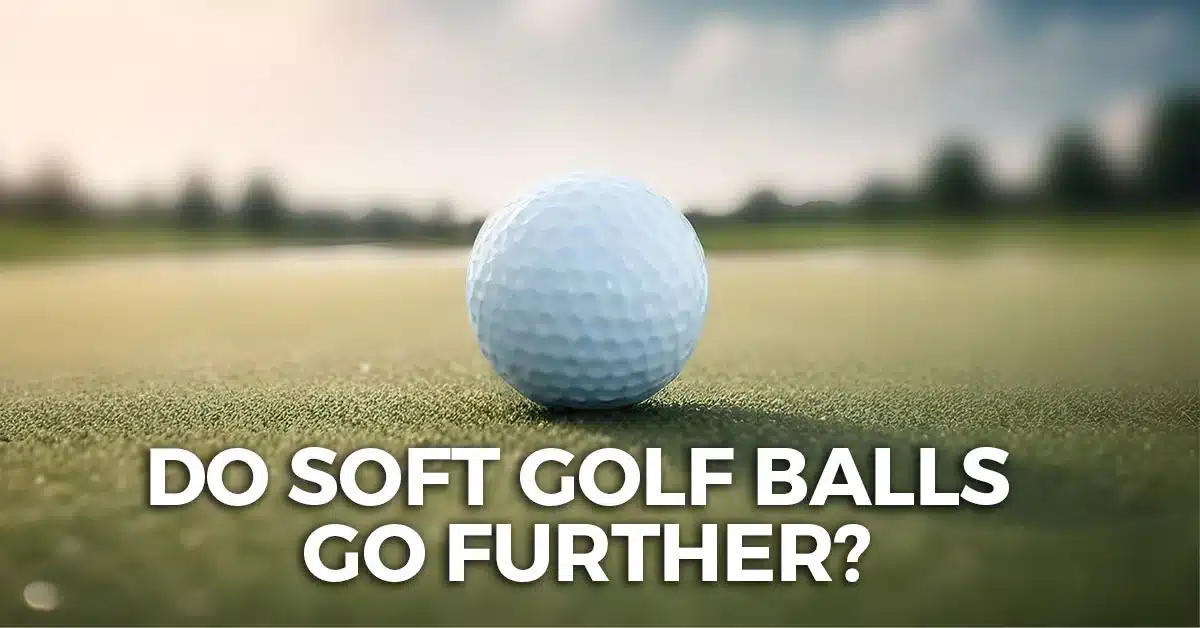As a Golfer, you constantly search for approaches to improve your game at a course. Having good golf clubs in your bag and having perfect golf balls that suit your skills are also necessary.
Like other sports equipment, various golf balls, primarily hard and soft, are available on the market. If you are a golfer with a slow swing speed and want to increase your distance at a course, you might be thinking about which golf ball you should choose, and if you choose soft golf balls, then the question arises: Do Soft Golf Balls Go Further? Yes, Soft Golf Balls go further.
In this article, I will tell you in detail about Do Soft Golf Balls Go Further, the Advantages of having Soft Golf Balls, the differences between Soft and Hard Golf Balls, and the best softball you can choose.
Let’s journey through the complexities of golf ball dynamics to discover the truth about the claim: Do Soft Golf Balls Go Further? Please take out your clubs, and let’s begin exploring the science of swinging.
Do Soft Golf Balls Go Further?
One of the longest-running debates among golfers is: Do soft golf balls Go Further? As golf technology advances, manufacturers promise soft golf balls to give you better performance and longer distances at the course.
Soft golf balls can go further and travel great distances. One important factor that plays an important role in the ball’s traveling is the golf ball’s compression. Generally speaking, soft golf balls compress more when they contact the clubface because they have lower compression. Some golfers prefer this softer feel because it can give them more control and spin around the greens.
Softer balls help players with slower swing speeds to achieve greater distance. These balls compress easily, which facilitates greater energy transfer and could lead to longer shots. Since soft golf balls are generally thought to spin less than firmer golf balls, they should be longer and straighter off the tee and have less spin to the back and side.
These balls’ manufacturers frequently say they provide greater accuracy, better spin rates, and more control. Golfers need to strike a balance between distance and control. Soft golf balls provide a softer feel and increased spin, aiding in control around the greens.
Advantages of Soft Golf Balls:

Your preferred golf ball is a key element that affects your overall performance, regardless of skill level. Soft golf balls come with several advantages that appeal to a variety of golfers, and these advantages can influence different aspects of a player’s game. Here are some key advantages of using soft golf balls:
- Feel and Control.
- Spin rate.
- Low compression.
- Longer Distance.
- Reduced Vibrations.
Feel and Control:
One of the main advantages of a soft golf ball is its soft feel, as your touch and feel can greatly impact how well you hit the shot. You can feel more in control if you’re using a comfortable feeling golf ball.
Golfers appreciate this tactile feedback because it improves shot control, particularly around the greens. The soft feel can improve a player’s capacity to execute precise shots and make small adjustments.
Spin Rate:
Soft golf balls typically generate higher spin rates, especially on approach shots and pitches. This extra spin is helpful for professional golfers who want to control the ball’s trajectory, shape their shots, and generate more stopping power on the greens.
In addition to being longer, soft golf balls produce a lot of spin on short shots. You can hit the ball farther off the tee as a result.
Low compression:
Soft golf balls typically have less compression; slower swing speeds can compress them more easily. Golfers with moderate to slow swing speeds can benefit from this feature as it enables optimal compression for improved energy transfer and possibly longer distances.
Longer Distance:
When playing golf, distance is an important consideration. For an average player, hitting the ball at a competitive distance can be challenging. But a soft golf ball can be useful!
Soft golf balls can travel farther off the tee, compressing easily when they contact the club. They consequently travel a greater distance.
Reduced Vibrations:
Soft golf balls can lessen the vibrations transferred from the club to the hands when the ball strikes the ground. Those looking for a more comfortable and less jarring game of golf may find this especially helpful if they have joint problems. The swing feels smoother because of the reduced vibrations.
It’s essential to remember that even though soft golf balls have these benefits, each player’s playing style, preferences, and ability level will ultimately determine which golf ball they choose. Golfers frequently test out different ball kinds to determine which one best suits their style of play and improve their overall performance.
Difference Between Soft vs Hard Golf Balls:
The distinction between soft and hard golf balls lies in their compression, feel, and performance traits. By being aware of these differences, golfers can make well-informed decisions depending on their playing style, preferences, and skill level. The main differences between Soft and Hard Golf Balls are listed below:
Soft Golf Balls
- It is ideal for golfers who have slow swing speeds
- Soft golf balls have lower compression ratings
- A softer feel is produced upon impact by soft golf balls.
- Soft golf balls typically produce more spin rates.
- The improved control and softer feel of soft golf balls are appreciated by certain golfers, particularly in the short game.
Hard Golf Balls
- It is ideal for golfers who have fast swing speeds.
- Hard golf balls have higher compression ratings.
- The feel of hard golf balls is firmer.
- Hard golf balls have lower spin rates.
- Golfers who value distance and a more firm feel will likely favor hard balls.
Choosing between soft and hard golf balls depends on a golfer’s swing characteristics, playing preferences, and the specific performance attributes they prioritize. Golfers can test out both varieties to see which suits them the best.
Callaway Supersoft Ball – Best Soft Golf Balls

PROS
- It is budget-friendly.
- It provides the best distance for senior golfers.
- It helps you to increase your launch.
- It is simple to use and tolerant of mistakes.
- It increases the ball’s speed.
CONS
- It has limited spin on the greenside.
The overall winner for the best golf ball is the Callaway Supersoft, especially for those with slower swing speeds.
It has a low-compression core design that increases ball speed and facilitates ball launch, making it ideal for the typical senior golfer’s playing style.
Callaway has designed Callaway Super soft golf balls that allow golfers a higher trajectory and a softer landing to compensate for the decreased spin. This design makes them perfect for accurate approach shots. It is also best for senior golfers. Callaway Super Soft is a good choice if you are looking for the Overall Best Golf ball.
Conclusions on Do Soft Golf Balls Go Further:
In summary, Answering the question, Do Soft Golf Balls Go Further? Yes, Soft golf balls can go further. The lack of swing speed is the primary factor in selecting a soft golf ball.
Soft golf balls usually produce higher spin rates, particularly on approach shots and pitches. Professional golfers who wish to shape their shots, control the ball’s trajectory, and produce more stopping power on the greens will find this extra spin useful.
Choosing a golf ball is a matter of personal taste, so consider your playing style when deciding between a soft or hard ball. After reading this guide, whenever someone asks you whether soft golf balls go further, you can confidently respond to them. Also read our article on How long do golf ball last?
Frequently Asked Questions:
What Does “Compression” Mean in Golf Ball Terms?
The amount of compression a golf ball experiences when it hits the clubface is known as compression. Soft golf balls compress more readily because they have less compression. Compression impacts feel, spin, and energy transfer, affecting the ball’s overall performance.
Who Benefits the Most From Using Soft Golf Balls?
Soft golf balls are usually more advantageous for players with low to slow swing speeds. Less compression makes compression simpler and maximizes energy transfer, which could lead to a longer distance. Softballs can also be helpful for players who value feel and control, particularly when playing near greens.


